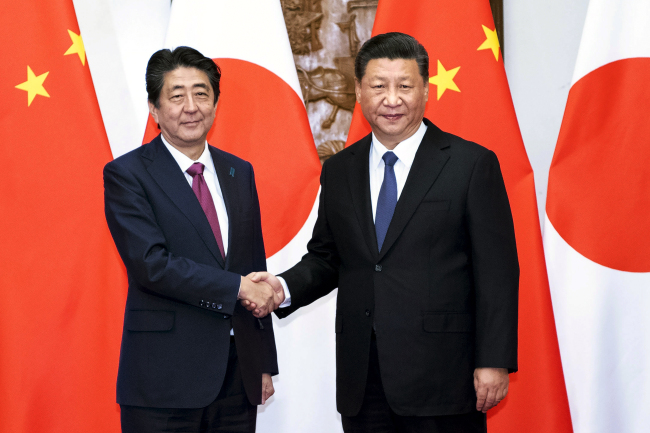The recent move by China and Japan toward reinvigorating their economic partnership could lead to aggravating the external environment for the Korean economy, experts here say.
The cooperative mood between the world’s second- and third-largest economies is coming at a time when Korea’s economic ties with its two neighboring powers have been shadowed by lingering diplomatic estrangement.
It has also raised concerns that Seoul may be sidelined from discussions on key matters involving the regional economy.
Seoul needs to be more pragmatic and strategic to minimize the fallout from the strengthening cooperation between Beijing and Tokyo, which seem to have decided to put aside their diplomatic discord to join hands in coping with mounting trade challenges from US President Donald Trump‘s administration, experts note.
“Sino-Japanese ties have significant room for cooperation based on strategic interests, while relations between Korea and Japan are more likely to be swayed by emotional factors,” said Jin Chang-soo, a senior researcher at the Sejong Institute think tank, in a recent commentary.
China and Japan signed 500 business deals worth $18 billion when Japanese Prime Minister Shinzo Abe made a three-day visit to Beijing last week, accompanied by nearly 1,000 delegates from Japanese companies. The two sides also concluded a $30 billion currency swap accord, 10 times the size of their previous swap deal that expired in 2013.
During his talks with Chinese President Xi Jinping and Premier Li Keqiang, Abe expressed Japan’s willingness to participate in China’s Belt and Road Initiative, proposing the two nations make a joint push to explore markets and build infrastructure in third countries.
Relations between Asia’s two biggest economies, which sunk to new lows in 2012 when Tokyo nationalized disputed islands claimed by Beijing, have warmed up recently as Trump has slapped steep tariffs on Chinese goods while also increasing pressure on Japan to reduce its trade surplus with the US.
Abe’s trip, which marked the first official visit to China by a Japanese prime minister in seven years, is expected to be reciprocated by Xi’s visit to Japan in the first half of next year.
In the face of a prolonged trade war with the US, China is more interested in securing advanced technology from Japan. For its part, Japan may hope that its improved ties with China will help bolster its position in trade negotiations with the US and give its companies wider access to China’s massive market.
It has yet to be seen how far Beijing and Tokyo will push their economic partnership, given the Trump administration’s persistent efforts to block what it views as China’s ambitious plan to supplant US technological dominance.
But the enhanced cooperation between China and Japan could result in reducing business opportunities for Korean companies in China and other emerging markets, experts say.
China might widen market access to Japanese companies particularly in auto, food and distribution sectors, in which Korean firms have already suffered a decline in sales amid lingering anti-Korean sentiment among Chinese consumers over Seoul’s hosting of an advanced US missile defense system.
Many Korean companies are still troubled with restrictive measures in doing business in China a year after Seoul and Beijing agreed to put bilateral exchanges and cooperation on a normal track while continuing to try to settle differences over the deployment of the anti-missile system.
If China and Japan push ahead with joint overseas development projects by combining the complementary elements of their companies, Korean competitors would be put at a disadvantage.
Korea’s diplomatic fray with Japan has deepened recently over historical and territorial issues, holding back the two sides from realizing the full potential of trade and investment between them.
Seoul may need to be in step with Tokyo to guard against a possible capital flight and cope with trade pressure from the Trump administration.
In January 2017, Tokyo suspended talks with Seoul on reopening a credit swap line in protest against the installation of a statue symbolizing Korean women forced into Japan’s wartime sexual slavery in Busan.
Korea and Japan in 2015 ended their currency swap deal worth $10 billion, the last in a series of swap arrangements set up between the two countries since July 2001.
Experts say it is necessary for Seoul to re-establish a swap line with Tokyo as US interest rate hikes and growing instability in emerging economies are threatening to rattle local currency and financial markets.
Last year, Seoul worried China would follow in the footsteps of Japan in using a currency swap scheme as a tool to increase pressure on Korea in rows over noneconomic issues. China agreed to extend a bilateral swap deal shortly before it expired in order to avoid marring its efforts to make the yuan a reserve currency.
Japan’s cooperation is also required to enable Korea to join the Tokyo-led Comprehensive and Progressive Agreement for Trans-Pacific Partnership trade deal. Finance Minister Kim Dong-yeon, who doubles as deputy prime minister for economic affairs, said last week Seoul would seek to use the CPTPP and other multilateral frameworks to cope with protectionism triggered by the Trump administration.
Experts note the two countries also share interests in cooperating to deal with low birthrates, aging populations and a new industrial revolution.
They note historical issues should not be allowed to hinder the two nations from strengthening practical cooperation to build a future-oriented partnership.
“It looks like we stand ready to raise issues with Japan while being too reticent on China’s heavy-handed behavior,” said an executive at a local tourism company, requesting anonymity.
In a larger context, Korea may play a role in promoting a tripartite cooperation with China and Japan, its largest and fifth-biggest export markets, to help enhance regional prosperity. To do so, experts say, the country should take a more balanced, practical and far-sighted approach in engaging with its neighbors.
By Kim Kyung-ho (
khkim@heraldcorp.com)






![[Herald Interview] 'Trump will use tariffs as first line of defense for American manufacturing'](http://res.heraldm.com/phpwas/restmb_idxmake.php?idx=644&simg=/content/image/2024/11/26/20241126050017_0.jpg)

![[Exclusive] Hyundai Mobis eyes closer ties with BYD](http://res.heraldm.com/phpwas/restmb_idxmake.php?idx=644&simg=/content/image/2024/11/25/20241125050044_0.jpg)